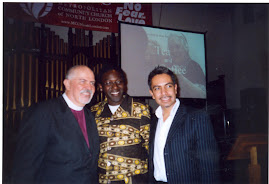
Uganda's anti-gay bill causes Commonwealth uproar
Proposed law that would impose life imprisonment on homosexuals has the potential to divide leaders at summit.The Commonwealth convenes for a summit this week amid growing furor over a proposed law that would impose life imprisonment on homosexuals in Uganda, whose President is chairing the gathering.
The law, proceeding through Uganda's Parliament and supported by some of its top leaders, would imprison anyone who knows of the existence of a gay or lesbian and fails to inform the police within 24 hours. It requires the death penalty for “aggravated homosexuality” – defined as any sexual act between gays or lesbians in which one person has the HIV virus.
The controversy is growing because Ugandan President Yoweri Museveni is the chairman of the Commonwealth Heads of Government Meeting in Trinidad and Tobago, which opens on Friday with Stephen Harper joining the leaders of 52 other countries.
If it is raised at the summit, the issue has the potential to divide Commonwealth leaders, who hold deeply polarized views on homosexuality. A number of Commonwealth countries, including Canada and Britain, have liberal views on the subject, but many African and Caribbean nations are socially conservative and maintain laws on their books that criminalize homosexuality.
Activists are urging the Commonwealth to make it clear that it will suspend Uganda's membership if the law passes.
Human-rights groups, including Amnesty International and Human Rights Watch, have condemned the bill. They say it is a product of a campaign by evangelical churches and anti-gay groups that has led to death threats and physical assaults against Ugandans suspected of being gay.
The governments of the United States and France have criticized the proposed law, with France expressing “deep concern.”
In Ottawa Tuesday, a spokesman for Mr. Harper also criticized the bill, using words that were virtually identical to the official U.S. comment of several weeks ago. “If adopted, a bill further criminalizing homosexuality would constitute a significant step backwards for the protection of human rights in Uganda,” said Dimitri Soudas, a spokesman for the Prime Minister's Office.
“Canada has clearly spoken out against human-rights violations committed against persons on the basis of their sexual orientation and we urge states to take all necessary measures to ensure that sexual orientation and gender identity may under no circumstances be the basis for criminal penalties, in particular executions, arrests, or detention.”
“Canada has clearly spoken out against human-rights violations committed against persons on the basis of their sexual orientation and we urge states to take all necessary measures to ensure that sexual orientation and gender identity may under no circumstances be the basis for criminal penalties, in particular executions, arrests, or detention.”
By chairing the summit without opposing the anti-homosexuality law, the Ugandan President “makes a mockery of Commonwealth principles,” Stephen Lewis, the former United Nations envoy on AIDS in Africa, said in a speech in Trinidad Tuesday. “This intended anti-homosexual statute has the taste of fascism.”
“The credibility of the Commonwealth is hanging by a spider's thread,” he said. “The putative legislation declares war on homosexuality. … What is put at risk here – beyond the threat of the death penalty for HIV-positive homosexuals – is the entire apparatus of AIDS treatment, prevention and care.”
The private member's bill was introduced last month by a Ugandan backbencher who described homosexuality as a “creeping evil.” The bill has not been formally endorsed by Mr. Museveni, but his government has allowed it to proceed through Parliament, and some of his top officials have praised it.
Analysts are predicting that the law will be approved by Parliament with only minor revisions. A senior government member, Ethics and Integrity Minister James Nsaba Buturo, said he views the bill “with joy” because it will “provide leadership around the world.”
The law would impose a sentence of life imprisonment on anyone who “penetrates the anus or mouth of another person of the same sex with his penis or any other sexual contraption.” The same penalty would apply if he or she even “touches another person with the intention of committing the act of homosexuality.”
The law requires a three-year prison sentence for anyone who is aware of evidence of homosexuality and fails to report it to the police within 24 hours. It allows for the prosecution of Ugandans who engage in homosexual acts in foreign countries. And it imposes a prison sentence of up to seven years for anyone who defends the rights of gays and lesbians.
These clauses have “a powerful Orwellian flavour” and reflect a “twisted world of sexual paranoia,” Mr. Lewis said in his speech to the Commonwealth People's Forum, a civil-society group. “Can you imagine a father or a mother turning in a son or daughter? Can you imagine a teacher ratting on a student? But that's exactly what this law requires. I've truly never seen its like before.”
Mr. Lewis, co-director of Aids-Free World, an international advocacy organization, noted that many other countries have laws against sodomy. “But nothing is as stark, punitive and redolent of hate as the bill in Uganda. Nothing comes close to such an omnibus violation of the human rights of sexual minorities,” he said.
“What is truly staggering about all of this is that not a peep of skepticism or incredulity has come from President Museveni.”
The proposed law would “demonize homosexuality” and “intensify stigma,” driving gays underground and making it much more difficult to prevent the spread of AIDS, Mr. Lewis said.















